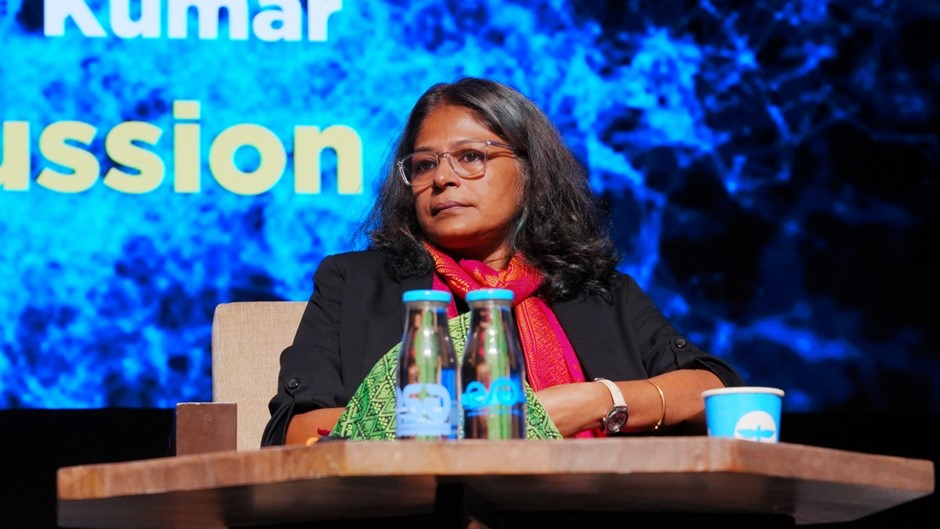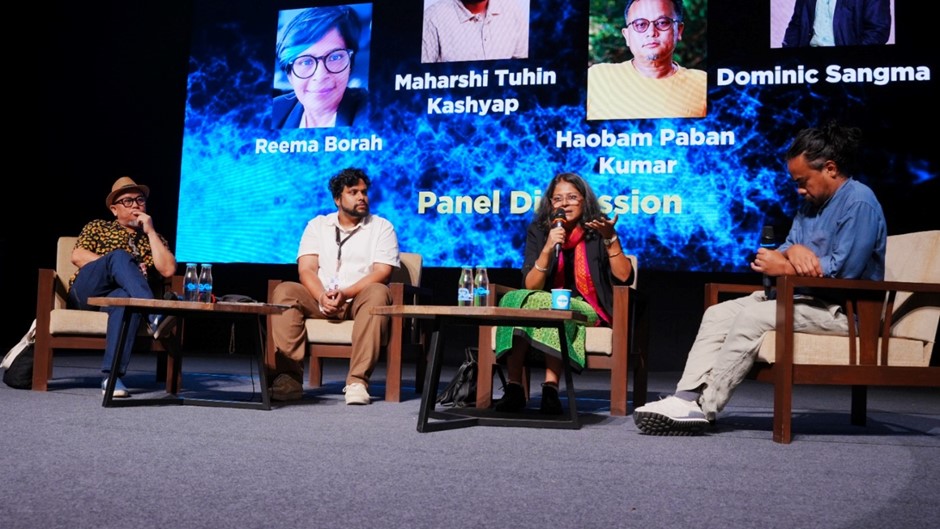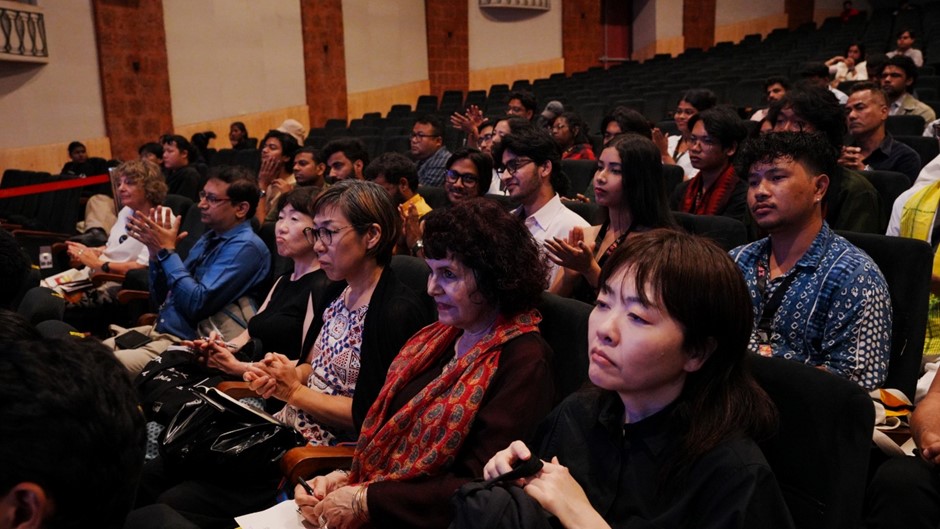New North-East Cinema discussion : Voices, Vision, and the Future of Film Education
#IFFIWood, 27 November 2025
A panel discussion on “New North-East Cinema and Film Schools was held at Kala Academy Auditorium on the 8th day of the 56th International Film Festival of India (IFFI), Goa 2025. The session highlighted the transformative role of film schools in shaping the region’s filmmakers and storytelling traditions. Leading voices from the North-East shared personal journeys, experiences, and insights on the evolving landscape of cinema in the region.

The discussion was moderated by Dominic Sangma and featured eminent filmmakers from Manipur Haobam Paban Kumar and Assamese filmmakers Reema Borah and Mahrishi Tuhin Kashyap.
“The struggle for recognition continues, shaping the cinema we create.” — Haobam Paban Kumar
Haobam Paban Kumar, a veteran filmmaker from Manipur, shared his personal journey of navigating the challenges of formal film education in the 1990s. At a time when only two major institutions existed—FTII Pune and SRFTI Kolkata—aspiring filmmakers from the North-East faced immense competition and limited opportunities. Paban recounted his six-year journey to gain admission to SRFTI, during which he also apprenticed under the legendary filmmaker Aribam Shyam Sharma. He reflected on how this rigorous training helped him refine his craft, develop a critical cinematic perspective, and understand the nuances of narrative storytelling. Despite the progress over the years, he emphasized that filmmakers from the North-East still strive for recognition and platforms to showcase their work. He shared that his own community from his film institute helped him building his career.

“True stories come from home, and understanding it is what shapes a filmmaker’s voice.” — Maharshi Tuhin Kashyap
Maharshi Tuhin Kashyap spoke about how his time at SRFTI profoundly reshaped his vision as a filmmaker. Initially drawn to the glitz of mainstream Bollywood, Kashyap realized the importance of exploring authentic stories rooted in Assam. He credited his film education for teaching him to observe deeply, reflect critically, and embrace his cultural heritage as a source of creative inspiration. “Understanding one’s own land and history is not just an academic exercise—it is essential for storytelling that resonates both locally and globally,” he noted.

“North-East cinema has a rich history that deserves to be seen and heard on national and global screens.” — Reema Borah
Reema Borah shared how FTII nurtured her cinematic sensibilities and personal growth, even as she navigated the absence of North-East cinema in formal curricula. She highlighted that despite the region’s rich cinematic history—from Ishanou to Ganga Siloni Pakhi, and pioneering Assamese films dating back to 1935—North-East cinema has long remained underrepresented in national discourses. Borah praised the establishment of a new film institute in Arunachal Pradesh, describing it as a vital step in bringing the languages, traditions, and narratives of the North-East to broader audiences.

“The best stories come from your own land. Film school teaches you how to tell them.” — Dominic Sangma
Dominic Sangma, serving as the moderator, framed the discussion within the broader context of storytelling and education. Drawing on his roots in oral storytelling traditions, Sangma emphasized that exposure to global cinema challenged and expanded his perception of narrative structures. He underscored that the most compelling stories often arise from an intimate understanding of one’s culture, landscape, and community. Film education, according to Sangma, provides filmmakers with the technical skills, theoretical grounding, and confidence to translate these stories onto the screen effectively.

The discussion concluded with a shared acknowledgment that film schools play an indispensable role in nurturing talent, preserving cultural identity, and empowering North-East filmmakers to create cinema that resonates both locally and globally. It also highlighted the need for continued investment in infrastructure, mentorship, and platforms to amplify the voices of North-East storytellers.

About IFFI:
Born in 1952, the International Film Festival of India (IFFI) stands tall as South Asia’s oldest and largest celebration of cinema. Jointly hosted by the National Film Development Corporation (NFDC), Ministry of Information and Broadcasting, Government of India and the Entertainment Society of Goa (ESG), State Government of Goa, the festival has grown into a global cinematic powerhouse—where restored classics meet bold experiments, and legendary maestros share space with fearless first-timers. What makes IFFI truly sparkle is its electric mix—international competitions, cultural showcases, masterclasses, tributes, and the high-energy WAVES Film Bazaar, where ideas, deals and collaborations take flight. Staged against Goa’s stunning coastal backdrop from November 20–28, the 56th edition promises a dazzling spectrum of languages, genres, innovations, and voices—an immersive celebration of India’s creative brilliance on the world stage.
For more information, click on:
IFFI Website: https://www.iffigoa.org/
PIB’s IFFI Microsite: https://www.pib.gov.in/iffi/56/
PIB IFFIWood Broadcast Channel: https://whatsapp.com/channel/0029VaEiBaML2AU6gnzWOm3F
X Handles: @IFFIGoa, @PIB_India, @PIB_Panaji
* * *
 PIB IFFI CAST AND CREW | Ritu Shukla/ Sayyid Rabeehashmi /Pushpa Maibam/Hidangmayum DK Sharma/Darshana Rane | IFFI 56 - 096
PIB IFFI CAST AND CREW | Ritu Shukla/ Sayyid Rabeehashmi /Pushpa Maibam/Hidangmayum DK Sharma/Darshana Rane | IFFI 56 - 096
Release ID:
2195382
| Visitor Counter:
492
Read this release in:
Marathi
,
Khasi
,
Urdu
,
Konkani
,
हिन्दी
,
Manipuri
,
Bengali-TR
,
Assamese
,
Punjabi
,
Gujarati
,
Tamil
,
Kannada
,
Malayalam